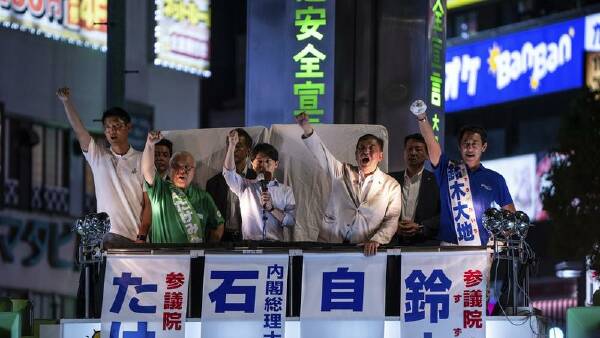
Japan’s ruling coalition, led by Prime Minister Shigeru Ishiba, is projected to lose its majority in the upper house, according to early exit polls. The potential loss comes at a critical time, as the government faces an impending deadline for a trade deal with the United States, which could lead to significant tariffs on Japanese exports.
The election held on Sunday did not directly determine the fate of Ishiba’s minority government; however, it places increased pressure on the embattled leader. In the previous October elections, Ishiba’s administration lost control of the more powerful lower house. The Liberal Democratic Party (LDP) and its coalition partner, Komeito, needed to secure 50 seats to maintain control of the 248-seat upper chamber, but exit polls from public broadcaster NHK suggest they could win between 32 and 51 seats. Other estimates indicate the coalition might hold around 41 to 43 seats.
If the coalition ends up with fewer than 46 seats, it would mark its worst performance since its formation in 1999. This follows a concerning result in the lower house election, where the LDP faced its worst outcome in 15 years. Such a scenario could open the door to no-confidence motions that threaten to topple Ishiba’s administration and possibly trigger new general elections.
Opposition parties focusing on tax cuts and increased welfare spending are expected to gain ground, as rising consumer prices become a pivotal issue for voters. The price of rice, a staple in Japanese households, has seen significant increases, further fueling public discontent. David Boling, a director at consulting firm Eurasia Group, commented, “The LDP was largely playing defense in this election, being on the wrong side of a key voter issue.”
The LDP has advocated for fiscal restraint, particularly amid concerns over Japan’s substantial national debt, which is the largest in the world. Investors remain anxious about the government’s ability to manage its finances effectively. Compounding these economic challenges, Japan faces a critical deadline of August 1 to finalize a trade agreement with the United States. Failure to do so could result in punitive tariffs impacting its largest export market.
Emerging as a notable force in the elections, the populist Sanseito party is projected to win between 10 to 15 seats, a significant increase from its previous single seat. The party’s “Japanese First” campaign and its rhetoric concerning foreign influence have resonated with voters, pushing previously fringe ideas into the mainstream political discourse.
Yu Nagai, a 25-year-old graduate student who voted for Sanseito, expressed his concerns about the presence of foreigners in his environment, stating, “When I look at the way compensation and money are spent on foreigners, I think that Japanese people are a bit disrespected.” His comments reflect a broader sentiment among voters who feel economic pressures are inadequately addressed by the current government.
As the election results unfold, the implications for Japan’s political landscape remain significant. The outcome could reshape the balance of power and influence the government’s approach to pressing economic and international issues in the coming months.







